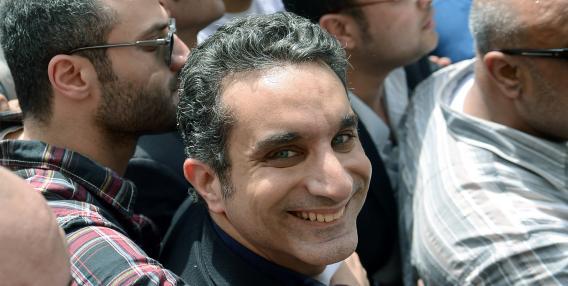Satirist Bassem Youssef was summoned and interrogated by Egyptian authorities this weekend after being charged with insulting President Mohamed Morsi, denigrating Islam, and spreading false news in order to disturb the peace. He’s out on bail now, but activists and critics are watching this one closely for the precedent it sets on the new government’s stance towards freedom of expression.
Youssef runs and hosts the satellite TV show Al Bernameg (English translation: The Program), a satirical news show that began as a series of popular YouTube videos after the 2011 Egyptian revolution. He’s commonly called the Egyptian version of Jon Stewart, and for good reason: Youssef modeled his widely-watched show after his comedic idol’s Daily Show. He even appeared as Stewart’s guest this past June. But Youssef’s background and political context are quite different from that of his American counterpart. For one thing, Youssef is also a heart surgeon who treated the wounded after a notoriously brutal attempt by the Mubarak regime to drive protesters from Tahrir square. For another, those he mocks clearly are much more willing to make life difficult for him.
Like the Daily Show, however, Youssef turns his satirical eye toward those in power, whether that means mocking the military, or its elected successors, the current government who took office in June. Now, it looks like Youssef could become the most prominent test case for the new Muslim Brotherhood-led government’s commitment to the democratic process that put it into power. Egyptian journalists, as the BBC explains, have already argued that the new Islamist-influenced constitution doesn’t do nearly enough to protect freedom of the press, expression, or religious minorities in the country. That, coupled with the arrest of five bloggers last week on charges of inciting aggression against the Muslim Brotherhood, have many seeing an ominous trend.
So far, public opinion on this one seems to be going to Team Youssef. Here’s the New York Times on the satirist’s arrival at court Sunday:
Mr. Youssef appeared at the High Court wearing an enormous black hat — modeled on one that Mr. Morsi wore while receiving an honorary degree in Pakistan last month. As he waited to be questioned by prosecutors, Mr. Youssef posted sarcastic observations on Twitter, including that the investigators felt the need to ask him about the color of his eyes. “The officers and the lawyers of the public prosecutors office want to take pictures with me,” he wrote. “Is this the reason for the summons?”
He has, it should be noted, since deleted those tweets.
Youssef has faced plenty of lawsuits over his program before. As the Associated Press notes, many of those are from Islamist lawyers who believe his show is blasphemous — one such lawsuit was dismissed in January. The specific complaints that prompted the satirist to turn himself in for questioning were filed following a March 1 episode that mocked president Morsi’s interview with TV personality Amr El-Leithy. In the past (including on the Daily Show), Youssef has addressed complaints by politicians by noting their very “human” reaction to being a target of satire: “Politicians who love my show when I criticise others,” Youssef told the Guardian, “call to complain when I target them.” Youssef, who is Muslim, had a stronger response this weekend to charges that he’s insulted his own religion. As quoted by state-owned al-Ahram, Youssef had this to say in a phone interview Saturday night:
“We are not the ones who insult religion, all we do is expose the channels that have misused religion and harmed it more than anyone else. If there is anyone who has insulted religion it is those who use Islam as a weapon for political reasons.”
On Sunday, Youssef posted a tweet in English to his one million-plus followers saying he was “touched by people’s support and media attention, however, there are many more activists being prosecuted that deserve to get that support.”
